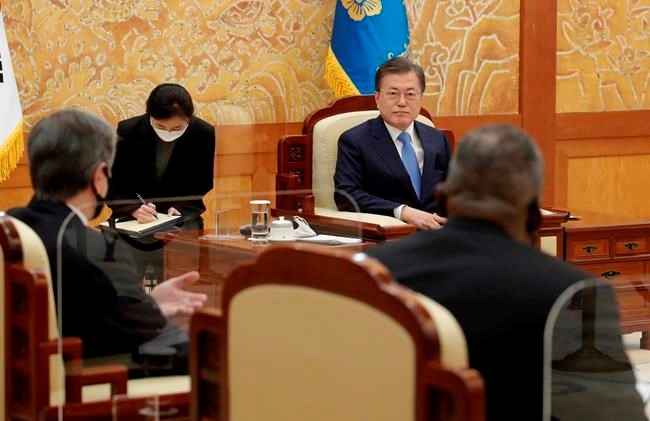SEOUL, Korea, Republic Of ŌĆö AmericaŌĆÖs top diplomat on Thursday pressed China to use its ŌĆ£tremendous influenceŌĆØ to convince North Korea to abandon its nuclear program, hours after the North said it will ignore U.S. offers to resume negotiations.
Secretary of State Antony Blinken spoke at the end of security talks in Seoul, which included
ŌĆ£Beijing has an interest, a clear self-interest, in helping to pursue denuclearization of (North Korea) because it is a source of instability. It is a source of danger and obviously a threat to us and our partners,ŌĆØ Blinken told a news conference.
He said Beijing has a critical role to persuade North Korea to denuclearize because most of the NorthŌĆÖs external trade goes through China. Blinken stressed that China is obligated by U.N. Security Council resolutions to fully enforce sanctions imposed over North KoreaŌĆÖs nuclear and missile tests.
China, the NorthŌĆÖs last major ally and biggest aid benefactor, has long been suspected of avoiding completely implementing sanctions on the North. Some observers say China believes a unified, pro-U.S. Korea would undermine its strategic interests and worries that a humanitarian disaster in North Korea could push swarms of refugees flooding over the countriesŌĆÖ border.
Chinese Foreign Ministry spokesperson Zhao Lijian said Beijing would ŌĆ£continue to play a constructive roleŌĆØ in working toward a political settlement on the Korean Peninsula. Zhao reiterated Thursday that China advocates a ŌĆ£two-track approachŌĆØ to the issue, whereby the U.S. would offer security guarantees to North Korea in exchange for Pyongyang abandoning its nuclear weapons programs.
ŌĆ£All parties concerned should move in the same direction, work together to manage differences, actively promote dialogue and contacts, and maintain regional peace and stability,ŌĆØ Zhao told reporters at a daily briefing Thursday.
Earlier Thursday, Choe Son Hui, North KoreaŌĆÖs first vice foreign minister, confirmed BlinkenŌĆÖs previous announcement that Washington had reached out to Pyongyang through several channels starting in mid-February, but it hasnŌĆÖt received any response.
Choe called the U.S. outreach a ŌĆ£time-delaying trickŌĆØ and said North Korea would discarding offers for talks unless Washington withdraws its hostility. ŌĆ£What has been heard from the U.S. since the emergence of the new regime is only a lunatic theory of ŌĆśthreat from North KoreaŌĆÖ and groundless rhetoric about ŌĆścomplete denuclearization,ŌĆÖŌĆØ she said.
Asked about ChoeŌĆÖs statement, Blinken said heŌĆÖs more interested in the thoughts of U.S. partners while he was making a regional tour. South Korean Foreign Minister Chung Eui-yong said ThursdayŌĆÖs talks dealt with the North Korean statement and its intentions. He said South Korea hopes for the early resumption of U.S.-North Korean talks.
U.S.-led diplomacy focusing on North KoreaŌĆÖs nuclear weapons remains stalemated because of disputes over U.S.-led sanctions. Experts are debating whether the United States and its allies should settle for a deal that would freeze North KoreaŌĆÖs nuclear activities in return for relaxing sanctions to prevent its arsenal from growing.
Earlier this week, the powerful sister of North Korean leader Kim Jong Un warned the United States to ŌĆ£refrain from causing a stink,ŌĆØ while criticizing the U.S.-South Korean drills that her government views as an invasion rehearsal.
Some experts say North Korea may further raise animosities with missile tests to boost its negotiation leverage. North KoreaŌĆÖs moribund economy is hurting because of the pandemic-related border closure that has significantly shrunk its external trade and a spate of natural disasters last summer.
After ThursdayŌĆÖs talks, Blinken, Austin and their South Korean counterparts said in a joint statement that North Korean nuclear and ballistic missile issues are ŌĆ£a priority for the allianceŌĆØ and reaffirmed a shared commitment to address those issues.
Austin said the U.S. is fully committed to the
Later Thursday, Blinken and Austin met South Korean President Moon Jae-in, who said Seoul will continue close
Blinken and Austin are on the first overseas trip by Cabinet-level officials since Biden took office. They visited Japan before coming to Seoul.
South Korean
Blinken said ThursdayŌĆÖs talks discussed ChinaŌĆÖs role, and ŌĆ£we are clear eyed about BeijingŌĆÖs consistent failure to uphold its commitments.ŌĆØ
ŌĆ£And we spoke about how BeijingŌĆÖs aggressive and authoritarian
Blinken will meet senior Chinese officials in Anchorage, Alaska, on his way back to Washington, while Austin will travel on to New Delhi for talks with Indian officials.
ChinaŌĆÖs ambassador to the United States, Cui Tiankai, said Beijing doesnŌĆÖt expect the Alaska talks will resolve all the issues between China and the U.S. and ŌĆ£we donŌĆÖt hold overly high hopes.ŌĆØ Cu still added that he hoped the meeting would be ŌĆ£a start and that the two sides can begin a dialogue process that is candid, constructive and realistic.ŌĆØ
Hyung-Jin Kim And Kim Tong-Hyung, The Associated Press




